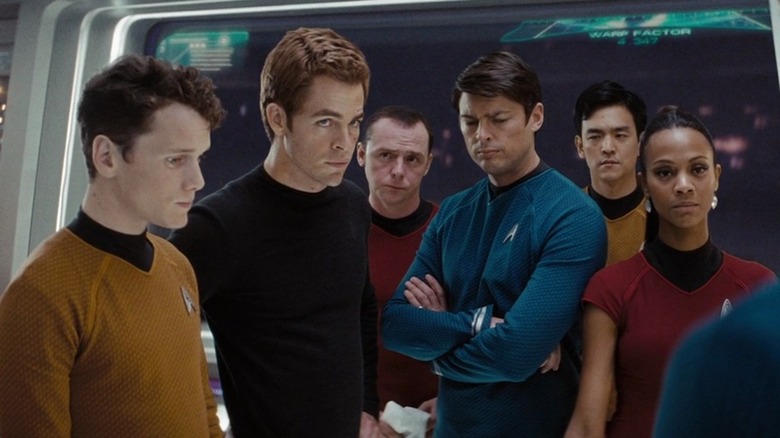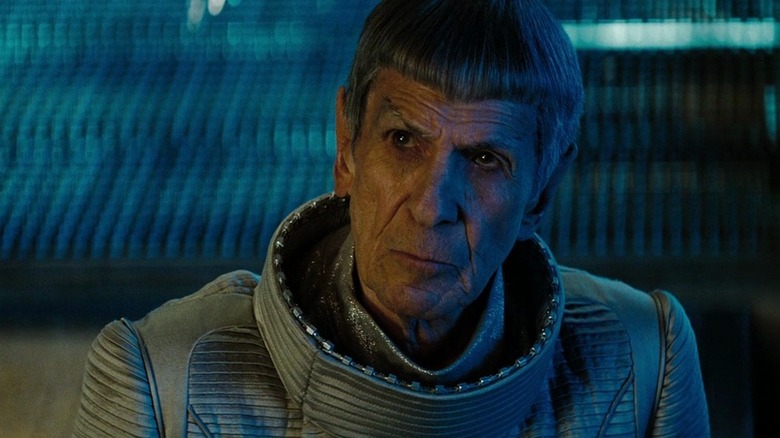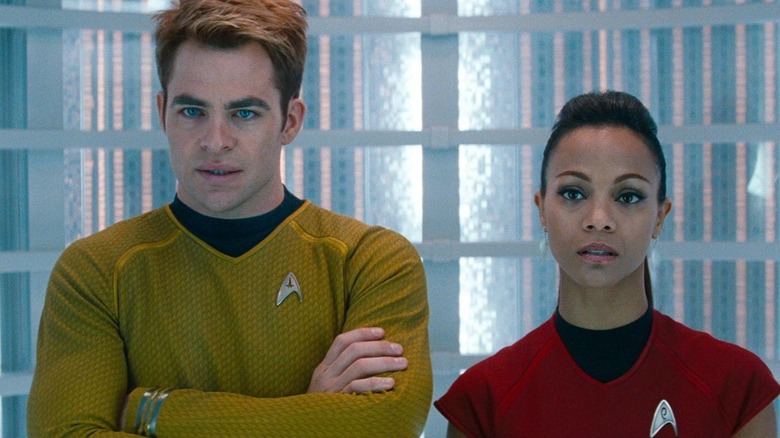Star Trek Briefly Had Bigger Plans For J.J. Abrams' Kelvin Timeline
The "Star Trek" movie franchise is in a bit of an odd spot right now, as we haven't had anything on the big screen since 2016's "Star Trek Beyond," which served as the third entry of J.J. Abrams' rebooted iteration. Dubbed the "Kelvin Timeline," these films existed in a new branch reality that Abrams created in 2009's "Star Trek," paving the way for a new incarnation that could honor what came before but pave a new path forward with a new cast. Now, Paramount is keeping things largely relegated to streaming, with shows like "Strange New Worlds" left to anchor the franchise. But there was a time when the studio was looking to exploit the Kelvin Timeline far more aggressively.
As explained in the book "The Fifty-Year Mission" by Mark A. Altman and Edward Gross, after "Star Trek" and before 2013's "Into Darkness," Paramount commissioned a series of in-universe novels. Several of these were published, but four of them were finished but never released. That list includes Alan Dean Foster's "Refugees," Christopher L. Bennett's "Seek a Newer World," David Mack's "More Beautiful Than Death," and Greg Cox's "The Hazard of Concealing." Speaking about his never-published novel, Foster had this to say:
"The altered timeline opened up a raft of possibilities in the sense that anything is fair game now, because nothing is canon. You can start all over again with the same characters and same general background and do anything you want. By the same token, just as the people who did the film realized, you don't want to alienate the legion of fans who have grown up with Star Trek, so while you've got unlimited range to your storytelling, you have to keep in mind that you don't want to do something so outrageous that it turns everybody off."
'All bets were off'
Foster is kind of the king of this stuff, as the guy behind legendary "Star Wars" and "Alien" novelizations, among many other things. So it's quite bizarre that Paramount would simply opt not to publish these stories. As the author explains, not being anchored to decades of prior continuity was freeing, as we were now following Chris Pine's Kirk and his Enterprise crew, rather than William Shatner's. Speaking further on the unpublished Kelvin novels, Mack explained that he was able to write for a potential new generation of fans, providing an easy entry point:
"All bets were off. The past of the Star Trek universe changed, and so might its future. As an author of original Star Trek tie-in novels, I was able to write a book based on the new film without having to worry about forty years of trivia and continuity. I had to respect only the details established in the new movie and I was encouraged not to muddy the waters with references to other books. The result, I hoped, was that More Beautiful Than Death would feel familiar and accessible to fans from whom the new movie was their entry point into the franchise."
Cox, who had authored several "Star Trek" novels tied to the previous canon, also shared his excitement about what writing for the Kelvin Timeline offered, saying, "The destinies of Kirk and Spock and the rest are no longer set in stone. We don't know what the future holds for them anymore." Bennett explained that he found the whole process of writing in this new timeline rather liberating:
"While it can be limiting to be deprived of the ability to build on past Trek continuity, it's also somewhat liberating not to be bound by such an enormous canon, to build a story purely on one movie and the fundamentals of the TOS [the original series] characters and universe."
Paramount gets cold feet
Given that Paramount tried — and failed — several times to make a fourth Kelvin Timeline "Star Trek" movie, these novels take on a bit more weight for fans. What treasures are contained within? Surely there are a great deal of fans out there who would like to go on some more adventures with Chris Pine's Kirk and the gang. So the question we're left with is: What the heck happened?
Ultimately, Paramount got cold feet about these novels, per "The Fifty-Year Mission," as the studio was worried that what the authors wrote might conflict with what they wanted to do in some eventual movie sequels. Here's what Foster had to say about it:
"I was led to believe that the books were canceled because Paramount didn't want to chance having anything come out that might contradict or otherwise adversely affect anything that future writers or directors might wish to do. In other words, there should be nothing a third or fourth or more films should have to worry about in regards to non-cinematic canon."
And so, these books sit on a shelf collecting dust. But who knows? Money talks, and given that there seems to be no new theatrical "Trek" movie on the horizon in this timeline, maybe these books will see the light of day after all. Stranger things have happened, and this business runs on squeezing every penny from big franchises. There are, undoubtedly, some pennies to be made here.


